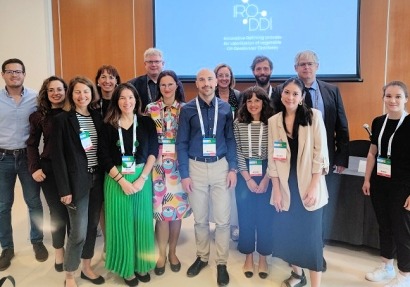IRODDI represents an example of direct application of how the bioeconomy and circularity have a place in the industrial environment, providing benefits to both today's industries and society. The technologies developed in the project have successfully led to the integral transformation of low-value resources into chemical products of direct commercial application. Specifically, the following processes have been successfully developed:
- In combination with bio-based ionic liquids, deodorizing distillates have become key ingredients for readily biodegradable detergents that exhibit higher efficacy and lower toxicity than their oil-based counterparts. The technologies developed for the production of these compounds are green, as they generate only water as a residue in the production process.
- Using highly selective, non-wasteful enzymatic technologies, deodorizing distillates have been converted into ingredients for biodegradable bio lubricants that pollute much less than those currently used commercially.
- New green (non-wasteful) processes have been developed to extract high-value molecules (squalene) present in deodorizing distillates and are successfully applied in sectors such as cosmetics, resulting in very high-quality products.
The consortium that has made IRODDI possible is made up of partners from four EU countries:
- Tecnalia Research & Innovation Foundation (project coordinator and leader in the application of products), BIOPLAT (dedicated to the exploitation, communication and dissemination of the project), Instituto de la Grasa - CSIC (in charge of the extraction of valuable compounds), Kliner Profesional (dedicated to the neutralization of surfactants by FFAs) and Sophim Iberia (supplier of raw materials with FFAs of different composition), from Spain;
- FeyeCon (responsible for applying a CO2 fractionation technology for the extraction of FFAs and obtaining valuable compounds such as squalene and tocopherols) and Zer0-E (responsible for process simulation, LCA and cost analysis), from the Netherlands;
- Fraunhofer (responsible for developing an enzymatic neutralization process for deodorant distillates), IoLiTec (designed and produced environmentally friendly ILs for use as reagents in FFA neutralization processes) and Jowat (involved with the application of fatty polyols developed from FFAs in polyurethane adhesives), from Germany;
- Sophim (used the squalene isolated by FEY in cosmetic applications, from France.
Thanks to the commitment and joint effort demonstrated by these 11 partners, IRODDI has contributed to the bioeconomy and circularity objectives of the European Union, managing natural resources in a sustainable way, reducing the dependence of the different industries on non-renewable resources, helping to mitigate climate change and strengthening the European commercial competitiveness.


